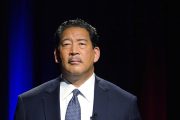
As President Obama ponders his options for executive action on immigration reform, a rationale has emerged for the defense of such action against what is expected to be intense political and legal opposition, the Associated Press reported Thursday.
The argument will be that Congress has not only refused to fix “broken immigration laws,” it has also failed to appropriate enough money to fully enforce existing laws against an estimated 11.5 million illegal immigrants, thereby leaving the executive branch with wide latitude in deciding on how and against whom to enforce those laws, the AP reported. Though Obama has not yet received a report on his legal options from Homeland Security Secretary Jeh Johnson, he is already considering the possibilities, including a major expansion of the Deferred Action on Childhood Arrivals program that allows illegal immigrants under age 30 to stay here and apply for work permits if they were brought here before age 16 and prior to 2007. The DACA policy has made some half a million illegal immigrants exempt from deportation. The contemplated expansion would extend that protection to millions more parents and relatives of those already covered and immigrants with no criminal record.
The Senate, in June 2013, passed a comprehensive immigration reform bill that would grant legal status and a path to citizenship to millions of illegal immigrants. But after a year had passed and the House had still not acted on the measure, Obama followed a private meeting with Hispanic and Latino groups advocating greater leniency in immigration laws with an announcement that he was prepared to act without Congress to achieve some degree of immigration reform.
“The failure of House Republicans to pass a darn bill is bad for our security, is bad for our economy, is bad for our future,” an obviously angry and frustrated Obama said in a Rose Garden event on June 30. “America cannot wait forever” for the House to act, the president said, promising “a new effort to fix as much of our immigration system as I can on my own, without Congress.”
But while Obama has spoken in the past of “prosecutorial discretion” on immigration cases, that term is generally understood to apply to considerations of a prosecution on a case-by-case basis. Further exemptions of entire categories of people will almost certainly give rise to the argument that the president is in effect rewriting the law.
“The question is how broadly can the president extend the categories and still stay on the side of spectrum of ensuring the laws are faithfully executed,” said Cristina Rodriguez, who left the Justice Department’s Office of Legal Counsel in 2013 to teach at Yale Law School.
Other options under consideration, such as changes to how green cards are distributed and counted, might be less controversial because of the support they enjoy from the businesses that employ immigrants, the AP reported. But Derrick Morgan of the conservative Heritage Foundation told the news organization that Obama will still face strong opposition to any attempt at an end-run around Congress.
Congressional Republicans have charged Obama with overstepping the bounds of presidential authority with executive actions a number of times and the House has voted to sue the president over his postponement of the deadline for implementing the employer mandate under the Affordable Care Act. The deadline was written into the healthcare bill that Congress passed and the president signed in 2010. Speaker of the House John Boehner has made it clear that further legal action may be expected if the president attempts to “rewrite our immigration laws unilaterally.”
“If the president fails to faithfully execute the laws of our country, we will hold him accountable,” Boehner said in a conference call with Republican House members.
The Constitution, in the first sentence of Article I, vests “All legislative powers herein granted” in the Congress of the United States. A law school graduate who has taught constitutional law, President Obama is up against not only Republican opposition, but his own previous statements as well concerning the limitations of the powers of his office. In a 2012 interview with Telemundo, the Spanish-language TV network, Obama said expanding the policy of exempting childhood arrivals from prosecution was not feasible.
“If we start broadening that, then essentially I would be ignoring the law in a way that I think would be very difficult to defend legally,” he said. “So that’s not an option.”
The president’s thinking on that matter apparently has changed in the past two years. The Constitution has not.


